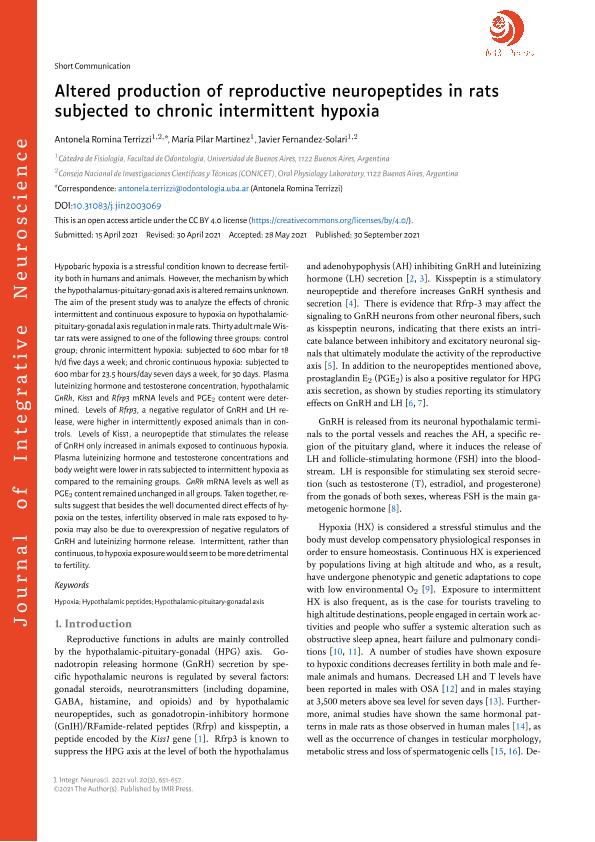Artículo
Altered production of reproductive neuropeptides in rats subjected to chronic intermittent hypoxia.
Fecha de publicación:
09/2021
Editorial:
Karger
Revista:
Neurosignals
ISSN:
1424-8638
Idioma:
Inglés
Tipo de recurso:
Artículo publicado
Clasificación temática:
Resumen
Hypobaric hypoxia is a stressful condition known to decrease fertility both in humans and animals. However, the mechanism by which the hypothalamus-pituitary-gonad axis is altered remains unknown. The aim of the present study was to analyze the effects of chronic intermittent and continuous exposure to hypoxia on hypothalamic-pituitary-gonadal axis regulation in male rats. Thirty adult male Wistar rats were assigned to one of the following three groups: control group; chronic intermittent hypoxia: subjected to 600 mbar for 18 h/d five days a week; and chronic continuous hypoxia: subjected to 600 mbar for 23.5 hours/day seven days a week, for 30 days. Plasma luteinizing hormone and testosterone concentration, hypothalamic GnRh, Kiss1 and Rfrp3 mRNA levels and PGE2 content were determined. Levels of Rfrp3, a negative regulator of GnRH and LH release, were higher in intermittently exposed animals than in controls. Levels of Kiss1, a neuropeptide that stimulates the release of GnRH only increased in animals exposed to continuous hypoxia. Plasma luteinizing hormone and testosterone concentrations and body weight were lower in rats subjected to intermittent hypoxia as compared to the remaining groups. GnRh mRNA levels as well as PGE2 content remained unchanged in all groups. Taken together, results suggest that besides the well documented direct effects of hypoxia on the testes, infertility observed in male rats exposed to hypoxia may also be due to overexpression of negative regulators of GnRH and luteinizing hormone release. Intermittent, rather than continuous, to hypoxia exposure would seem to be more detrimental to fertility.
Palabras clave:
HYPOTHALAMIC PEPTIDES
,
HYPOTHALAMIC-PITUITARY-GONADAL AXIS
,
HYPOXIA
Archivos asociados
Licencia
Identificadores
Colecciones
Articulos(OCA HOUSSAY)
Articulos de OFICINA DE COORDINACION ADMINISTRATIVA HOUSSAY
Articulos de OFICINA DE COORDINACION ADMINISTRATIVA HOUSSAY
Citación
Terrizzi, Antonela Romina; Martínez, María Pilar; Fernández Solari, José Javier; Altered production of reproductive neuropeptides in rats subjected to chronic intermittent hypoxia.; Karger; Neurosignals; 20; 3; 9-2021; 651-657
Compartir
Altmétricas




